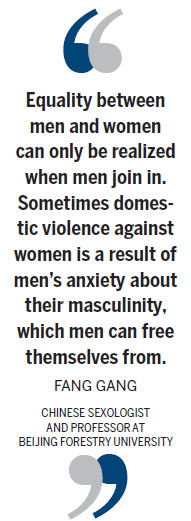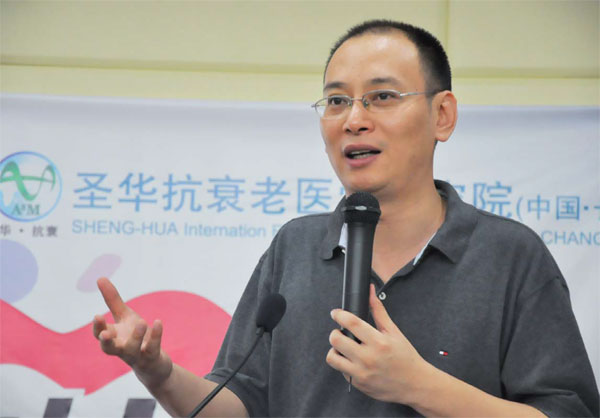The love of brothers and sisters

Research findings from the sexual closet: they are just like you and me
Fang Gang had been to the club twice before, but as he entered this time, he felt different.
But just as with his earlier visits, he was there strictly on business.
| Fang Gang says he always identifies himself with the marginalized, and he traces the reason for this back to his childhood. Provided to China Daily |
It was a spring evening in 2006, and Fang, 38, a PhD candidate at Renmin University in Beijing, had traveled to Shenzhen, Guangdong province, for a research project on male sex workers. At the club he would interview nangongguan, literally male public relations workers, for his thesis.
"The moment when I stepped through the door, I realized I was behaving differently than on my two previous visits. I no longer cared about how I should walk or speak. It was as natural as 10 years ago when I first arrived at the office of the newspaper I worked for. It's amazing to realize how fast you can change, and how fast and profound the surroundings can change you," he says.
Fang's field research lasted two months. He was trying to find out, in that specific environment, how the men's masculinity influenced their behavior in their sexual relationships with female customers and if it changed.
"Influenced by the hegemonic masculinity recognized by the society that man should dominate woman, sometimes nangongguan would refuse to provide the services that their woman customers wanted, because they thought that was not what men should do," Fang says.
For example, he says, a woman customer's request that two nangongguan kiss for her to watch was rejected.
Asked whether he was ever felt threatened, Fang replies, "never".
"Once someone introduces you into the club as a worker, nobody cares about who you are and what you do there. It's a very open space," he says.
Fang says young women looking for work would first ask to be the DJ or a waitress, but after about two weeks, they would talk to the "Daddy" or "Mum" (the leader of the sex workers) and ask to be a xiaojie, a female sex worker.
"Because that is the right thing to do at such clubs, like college teachers trying to become professors in their milieu," Fang says.

The research that he did for his PhD thesis is now playing an important role in the new program Fang, now a well-known Chinese sexologist and professor at Beijing Forestry University, is working on the aims to end gender-based violence.
Fang says he always identifies himself with the marginalized, and he traces the reason for this back to his childhood.
When Fang was 3, his father, an athlete, committed suicide; as a fatherless boy, Fang was often sneered at and bullied at school. Now that he has grown up, he says he always tries to speak up for the "weak" and for their rights.
In 1993, when Fang was working as a journalist at Tianjin Workers Daily, he came across a brief news report about a homosexual forum in Beijing. At that time, homosexuality was a forbidden topic. The forum was held in the name of AIDS prevention. But the media reports provoked public indignation and the forum was stopped.
"Even today, the mainstream attitude toward homosexuality is that it is a disease that needs treatment," Fang says.
Fang was intrigued by the news and he went to the organizer of the forum who introduced him to the homosexual community in Beijing.
"At that time, you could find gays in two places in Beijing, psychological clinics and the toilets in Dongdan Park.," Fang says.
Fang was amazed by their open attitudes on sex.
"I was rocked by how openly they would talk about sex. It's not about the topic itself, but the way it was talked about, the beauty of the courage to challenge the taboos."
Based on his interviews, Fang wrote several reports saying homosexuals are our brothers and sisters.
"I also wrote my first book, Homosexuality in China. I always wanted to become a writer. At 25, my viewpoint of the world, my values had changed tremendously."
Homosexuality was just the starting point. Fang later thought more about sexual plurality and wrote more articles and books in his 10-year career as a reporter and editor. In 2002, he decided to go back to school to study sexology with Pan Suiming, a sexologist at Renmin University.
His research has covered feminism, swinger clubs, transgender, nudists, sexuality education and masculinity.
He used to identify himself as a feminist, but says this has been twisted as a term for extreme people fighting for female-dominated society. Now he sees himself as someone who supports equality between men and women. In September, a non-government feminist organization, New Media Women Network, published a statement calling on schools to set up a system to stop sexual assaults.
It came after frequent reports of sexual assaults students in Chinese schools and universities, and after reports that a professor at Xiamen University was seducing female students.
Fang drafted a response to the statement, which was supported by other well-known Chinese sexologists, including Li Yinhe and Peng Xiaohui, advocating empowerment sexuality education for teenagers, letting them have the right to decide whether they want sex or not.
"We think teenagers are able to tell the bad from the good, to choose and to be responsible for themselves and others. There is not much sexuality education in China, but traditionally teenagers are told about anything related to sex," he says.
The response said "we firmly oppose any sexual violence at school," but "based on the situation of sex education in China and the expression of the statement, we are worried the proposal may have worrying results".
The response emphasized that the solution is sex education rather than simply bans or punishment, which may lead to violating of other people's rights.
Nov 25 was the International Day for the Elimination of Violence against Women, and Fang organized the Second Annual Meeting of the China White Ribbon Volunteers.
"Equality between men and women can only be realized when men join in. Sometimes domestic violence against women is a result of men's anxiety about their masculinity, which men can free themselves from. There is no need to follow society's requirement that masculinity be defined as strong and dominating."
"All of my research, including on masculinity, lets me know that a real open society should allow sexual plurality, which is not to encourage multiple sex partners, but to respect people's choices."
yangyangs@chinadaily.com.cn
(China Daily European Weekly 12/05/2014 page28)
Today's Top News
- Japan tempting fate if it interferes in the situation of Taiwan Strait
- Stable trade ties benefit China, US
- Experts advocate increasing scope of BRI to include soft power sectors
- New engine powers cargo drone expansion
- China to boost green industry cooperation
- Manufacturing PMI rises in November































